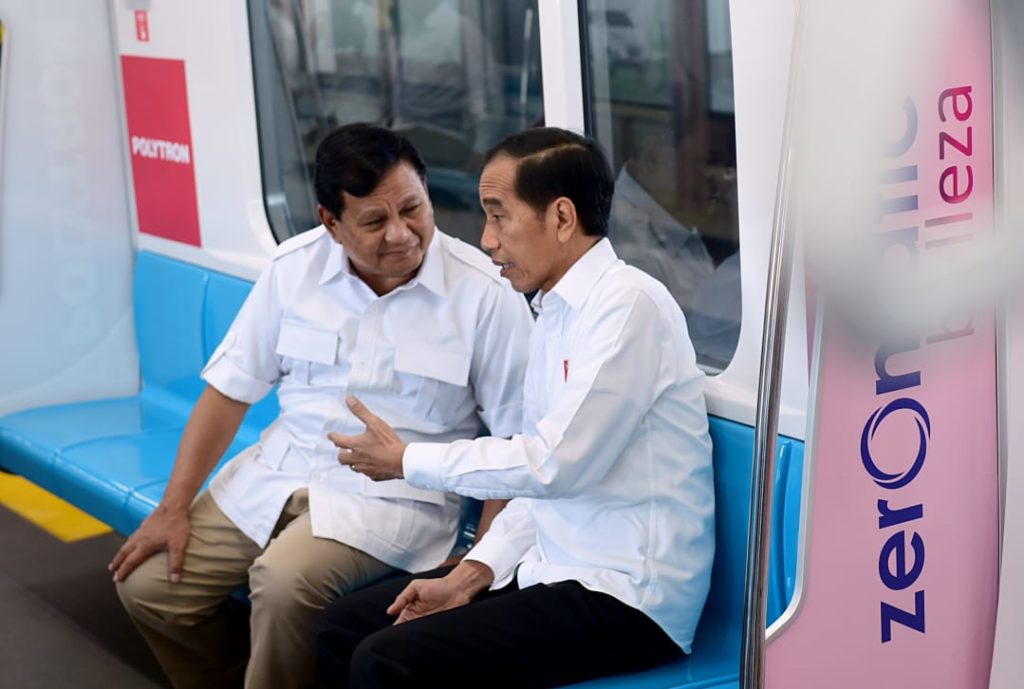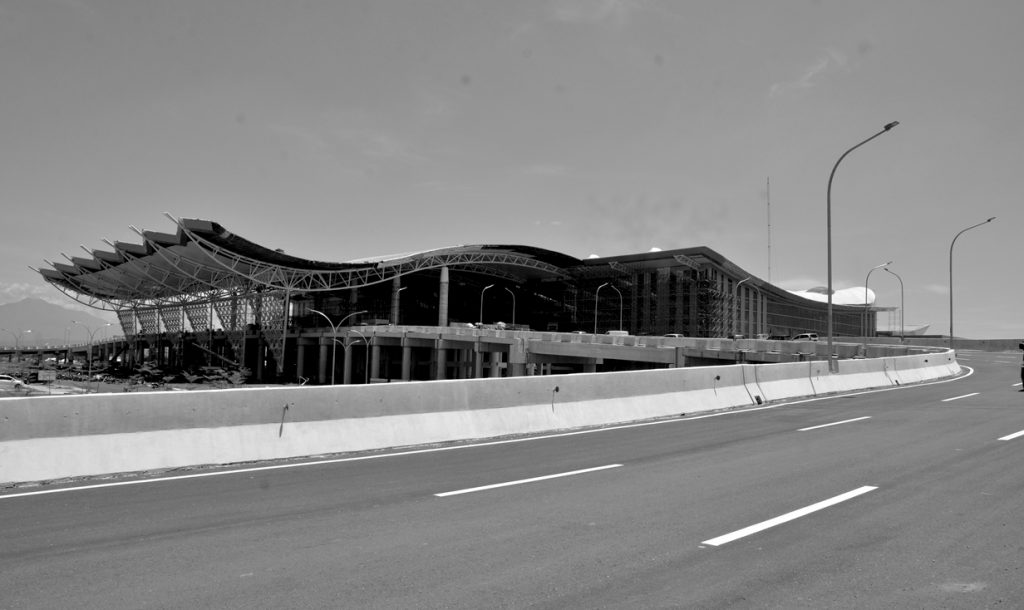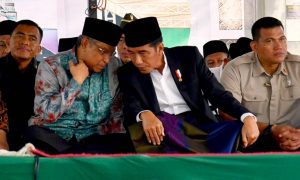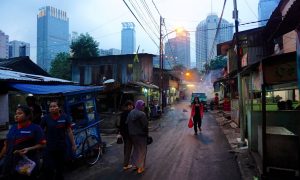The Constitutional Court’s ruling on Joko Widodo (Jokowi)’s victory in the predictably contentious, divisive 2019 presidential contest has sustained the president’s record of electoral invincibility. Since 2005 he has won five elections: twice for the Surakarta mayorship, once for the Jakarta governorship, and twice for the presidency. Now, with the presidential inauguration scheduled for October, Jokowi has set to work on the campaign promises he made with his running mate and future vice president Ma’ruf Amin.
Jokowi’s second term policies will likely be a continuation of work initiated over the last five years. In his first public speech after re-election, he confirmed that building infrastructure and improving the domestic business environment would remain a priority. The incoming administration also plans to focus on human resource development and effective execution of the state budget (Anggaran Pendapatan dan Belanja Negara, or APBN).
Jokowi is correct in believing that a well-managed APBN will benefit people through the provision of public goods and services such as healthcare, education, and infrastructure. It also means basic governance principles of professionalism, transparency, and accountability will be incorporated throughout the government activity cycle from planning to evaluation. The Indonesian Law on State Finances, passed in 2003, acknowledges these tenets as fundamental for modernising the country’s public financial management system.
Materialising the principles, however, will not be easy, for doing so may be incompatible with the way Jokowi leverages his political capital. One version of him is presented as an idealist reform champion. Yet another version shows him as a pragmatic politician, an incumbent president who like many presidents before him will do what it takes to stabilise his government. When Jokowi first assumed office in late 2014, he had the support of less than half the members of the House of Representatives (Dewan Perwakilan Rakyat, or DPR). By mid-2016, he had won over opposition parties Golkar and PAN in exchange for ministerial positions, securing the majority coalition in the DPR. More recently, he has appeared receptive to signs that opposition parties, including Gerindra and Demokrat, are looking to cooperate, in stark contrast with their demeaning campaign messages leading up to the election. Jokowi’s record has proven that he is prepared to accommodate political bargaining, which could potentially influence the formulation of policies and, ultimately, the management of APBN.
The myth of apolitical policymaking
Political negotiations in policymaking processes are inevitable. The APBN document, which outlines the government’s work plan along with the annual budget figures, is the result of deliberations between the executive and legislative branches. While the president and his aides may have their prerogatives regarding policy and spending decisions, they are balanced by the DPR’s mandate to scrutinise and approve them. Business groups and civil society organisations also have lobbying powers and represent the interests of their respective constituents. The process of policymaking cannot be apolitical. But having too much political influence can harm the purpose of policymaking to allocate public money for public interests. As it happens, at least two problems can be identified.
The first problem emerges when policy outcomes no longer serve the public interest. Consider the government’s approach in addressing market failures, such as taxi and ojek (motorcycle taxi) quasi-monopolies at transport hubs like airports and train stations. The absence of reliable, integrated public transportation systems in Indonesia has made them a realistic option for most travellers. However, in many cities, transportation options are even more limited. Local taxi and ojek drivers find ways to collude and drive up the prices; some prevent more affordable ride-hailing apps from entering passenger pick-up areas.
That the authorities condone such practices is likely a result of small-scale political lobbying, but the same thing can also happen in a much bigger context. In the weeks leading up to this year’s Idul Fitri holiday period, frustrated airline passengers watched as ticket prices soared; many attributed it to the perpetuated duopoly of Garuda Group and Lion Group. In a different political economy setting, we see how cigarette businesses are thriving despite their products’ harm to individual health, how the car industry is growing despite the excessive air pollution in urban areas, and how reclamation projects are continuing despite their environmental damage to coastal regions. These are cases in which policy is advocated (or dismissed) to benefit a select few rather than provide much-needed public goods and services.
The second problem concerns the politics of APBN, and how resources can be hijacked for personal gain rather than social benefit. We have witnessed high-level public office holders abuse their position and power to win procurement contracts through backdoor deals, while others artificially inflate the cost of overheads and pocket the difference—a common method for corruption in Indonesia, according to a study by Indonesia Corruption Watch. Earlier this year Idrus Marham, then-Minister of Social Affairs and former Secretary General of Golkar, was sentenced to 3 years imprisonment for channelling funds from the Riau power plant project towards the Golkar national gathering. Previously, several party chairmen were also arrested by the Anti-Corruption Commission (KPK) for fraudulently exploiting ministerial programs, including Luthfi Hasan Ishaaq, Anas Urbaningrum, Suryadharma Ali, and Setya Novanto.
At any rate, the evidence-based approach is minimised, if not completely ignored, in policy design. Policies are made without calculating the economic costs borne by the public. Resources are allocated without considering the opportunity costs to the organisation. Reports are prepared to meet checklist requirements when substantive evaluation tools could have been developed instead.
This is consistent with a study by the University of Melbourne and the Indonesian Centre for Law and Policy Studies (PSHK) that found little evidence that the Indonesian government undertakes background research or conducts analytical work before a policy decision is made. In an ideal situation, data should form the critical basis for policy formulation, but apparently not in Indonesia. At a time where many countries are working towards evidence-based policy, the last thing we’d expect is a government that practices the exact opposite: policy-based evidence.

PRABOWO AND JOKOWI RIDE THE MRT IN JAKARTA, JULY 2019 (PHOTO: PRESIDENT JOKO WIDODO ON FACEBOOK)
What can be done?
Given the current landscape, it is implausible to expect any policymaking that fully incorporates a technocratic approach that maximises public utility. Decisions are partisan or arbitrary to say the least. The use of data, if any, is downgraded to backfilling positions that favour the directive. Indonesia’s recent bid to host the Olympic Games is another good example. Last February, Jokowi sent a letter to the International Olympic Committee in Switzerland expressing interest in hosting the 2032 Olympics. The public seems receptive to this idea, and in fact excited at the prospect of hosting another international multi-sport spectacle given the country’s success in hosting the Asian Games in 2018.
Experiences from other countries, however, have shown that hosting the Olympics is an expensive undertaking; sport-related costs, not including general infrastructure development, average out to US$5.2bn. To put this into perspective, the annual budget of the Ministry of Youth and Sports for the last three fiscal years is, on average, only $231 million. Furthermore, the Olympics, according to one study, is a money-losing proposition for host cities, and even more so for cities in developing countries.
Voting out the landlords in Flores
Economic change is eroding the political power of traditional custodians of land in this part of Eastern Indonesia.
Using this framework, hosting the Olympics is treated as a program or perhaps a project nested in a bigger program; when Indonesia placed its bid the government should have openly discussed the impacts that action is trying to achieve. Unfortunately, the candidature was neither mentioned in Jokowi’s campaign materials nor discussed in the country’s latest development plan, hence making it harder to unpack the logic behind the decision.
The logic model should be developed in tandem with a thorough cost-benefit analysis (CBA). The concept is simple: proceed with a policy proposal that brings more good than harm to society. When there are several actions to choose from, selecting the one with the greatest net benefits is preferred. The US government was the earliest adopter of the CBA approach in policymaking. Riding the deregulatory movement, Ronald Reagan issued an executive order in 1981 that stipulates, “Regulatory action shall not be undertaken unless the potential benefits to society for the regulation outweigh the potential costs to society.”
Through a CBA, all benefits and costs are factored in, including categories that are difficult to quantify. Take for example a toll road project: its impact categories would include not only tangible costs (such as construction and maintenance costs) and tangible benefits (such as collected toll fees) but also other intangible items like time saved and accidents avoided by commuters. In Indonesia, CBA application is quite common in the infrastructure sector; one of the regulatory bases pertaining to Public-Private Partnership mechanism requires such analyses to be done before a project proceeds to construction. Nevertheless, CBA needs to be expanded to underpin the design of policy in general.
A CBA would have been helpful in the Olympics bid decision, but beyond that it is a useful tool in materialising many of Jokowi’s calls for reforms. In 2016, for instance, he expressed concerns because too many regulations at the local level are hindering ease of doing business and accordingly asked for a total simplification. CBAs can guide which regulation should or should not be eliminated, by juxtaposing its costs (i.e., the time required to supervise a procedure) and benefits (the added value of a procedure).
The same analysis can also bring controversial policies to light, such as whether and where to move the capital, whether the government should bail out BPJS’ deficit, whether investment should be directed more towards higher or early childhood education, and whether a high-speed railway should be constructed to connect Jakarta and Bandung. With some transparency, for each of these the general public would finally have more understanding of how much benefits (and costs) would actually go to them.
It is also in the nature of CBA that an action is assessed not only against its costs but also against its counterfactual: if the same amount of money was spent on something else, would the benefit be greater? Hence, completed projects like Kertajati Airport in West Java and the LRT system in Palembang, South Sumatra, which have experienced lower than expected usage rates, could have been evaluated as well. Indeed, the extent to which CBAs can be of use should never be overstated, and the CBA process’ limitations as highlighted by its critics should be admitted. But with the presence of a CBA on the table any political debate on some policies is going to be more constructive.
The way forward
Indonesia can’t spend billions of rupiah on programs and projects that do not make enough people’s lives better. For that, in his second term, Jokowi needs to institutionalise the vision for evidence-based policymaking. His issuing a presidential regulation on One Data last month, which enables improved data quality and seamless data exchange across government entities, is a sign he is not anti-technocratic in his approach.
Institutionalisation can be done through the passing of regulations that will guide ministries, agencies, and local governments in implementing technocratic measures like logic models and CBAs. The regulatory basis should be accompanied with decent resources to develop infrastructure and build capacities within the bureaucracy. The logic model and CBA are not exhaustive but mainstreaming the two will certainly be a significant game changer and a solid starting point. The Indonesian government can also take its cues from international examples such as the Productivity Commission in Australia, and the Congressional Budget Office and the Office of Management and Budget in the US.
If Jokowi cares about creating a legacy beyond electoral invincibility he should think about how policy is formulated and how the APBN is managed under his administration. Policymaking is inherently political, but there’s a chance for him to offer something new. Moreover, with the second term already in his hands, there is no need for him to seek re-election. As he implied during a recent interview, “Because this is my last term, so I have no burden. I have nothing to lose.” Jokowi came to the national stage as the new hope, and hopefully is still one when it comes to evidence-based policymaking vis-a-vis APBN management. Otherwise, Indonesia can only wait for the 2024 election and hope for another champion of reform with some technocratic affinity. Who knows?
 Facebook
Facebook  Twitter
Twitter  Soundcloud
Soundcloud  Youtube
Youtube  Rss
Rss 



